By Aaron Grinter · Thursday, April 16, 2020 Aaron Grinter’s “Metaphors in Science: Lessons for Developing an Ecological Paradigm” appears in Telos 190 (Spring 2020): Economy and Ecology: Reconceiving the Human Relationship to Nature. Read the full article at the Telos Online website, or purchase a print copy of the issue in our online store. Individual subscriptions to Telos are available in both print and online formats.
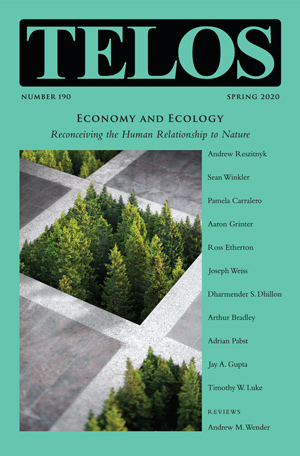 The scientific method seems familiar to most, but an important element of this practice is often overlooked: the metaphor. This article explores the role played by metaphors in the conception and experimentation of scientific hypotheses, and the extent to which the process of metaphorical consideration is founded in imagination and creativity. With positivistic and reductionist traditions coming to prominence within scientific disciplines, there is emerging a corresponding lack of imagination and increased dislocation from the natural processes being studied. Using the complex process logic involved in metaphorical understanding, the task will be to develop a new paradigm to break out of these stifling traditions, one that has the potential to consider the complex holistic interrelations of the biosphere. As the epoch of the Anthropocene becomes more inculcated in contemporary culture, there has never been a more important time to reassess our relationship to, and position within, the natural world. The scientific method seems familiar to most, but an important element of this practice is often overlooked: the metaphor. This article explores the role played by metaphors in the conception and experimentation of scientific hypotheses, and the extent to which the process of metaphorical consideration is founded in imagination and creativity. With positivistic and reductionist traditions coming to prominence within scientific disciplines, there is emerging a corresponding lack of imagination and increased dislocation from the natural processes being studied. Using the complex process logic involved in metaphorical understanding, the task will be to develop a new paradigm to break out of these stifling traditions, one that has the potential to consider the complex holistic interrelations of the biosphere. As the epoch of the Anthropocene becomes more inculcated in contemporary culture, there has never been a more important time to reassess our relationship to, and position within, the natural world.
Continue reading →
By David Pan · Monday, March 16, 2020 Telos 190 (Spring 2020): Economy and Ecology: Reconceiving the Human Relationship to Nature is now available for purchase in our store. Individual subscriptions to Telos are also available in both print and online formats.
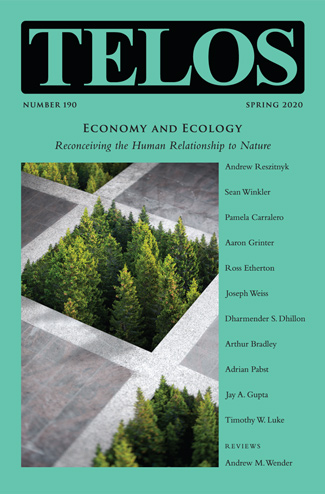 Our human relationship to nature defines our economic life. As Marx articulated in the 1844 manuscripts, labor involves an engagement with nature in order to fulfill human ends, the working up of nature as an “inorganic body.” Consequently, the world of work and that of the environment are really two aspects of our relationship to nature, and the shift in academic interest from economy to ecology as the burning issue of the day does not represent any real change in perspective. On a fundamental level, economy is ecology and vice versa. Thus, the issue of climate change is primarily one about the energy structure of our economy. If that structure before the Industrial Revolution boiled down to the way in which we were cutting down our forests, today the issue is how fossil fuels are leading to climate change. The other global natural disaster of our day, the coronavirus, has arisen as a consequence, first, of our treatment of wild animals as food and, second, of economic globalization, whose movements have established the pathways for the rapid spread of viruses. Our human relationship to nature defines our economic life. As Marx articulated in the 1844 manuscripts, labor involves an engagement with nature in order to fulfill human ends, the working up of nature as an “inorganic body.” Consequently, the world of work and that of the environment are really two aspects of our relationship to nature, and the shift in academic interest from economy to ecology as the burning issue of the day does not represent any real change in perspective. On a fundamental level, economy is ecology and vice versa. Thus, the issue of climate change is primarily one about the energy structure of our economy. If that structure before the Industrial Revolution boiled down to the way in which we were cutting down our forests, today the issue is how fossil fuels are leading to climate change. The other global natural disaster of our day, the coronavirus, has arisen as a consequence, first, of our treatment of wild animals as food and, second, of economic globalization, whose movements have established the pathways for the rapid spread of viruses.
Continue reading →
By Wayne Hudson and Arran Gare · Tuesday, February 6, 2018 For a New Naturalism, edited by Arran Gare and Wayne Hudson, is now available from Telos Press in our online store. Order your copy today and save 20% on the list price by using the coupon code BOOKS20 during the checkout process.
Contemporary political and social theory needs to be rethought with reference to posthistorical conditions and developments in the natural sciences. More emphasis needs to be placed on a wider naturalism that goes beyond modern objectivating naturalism: a naturalism that opens up to both differential naturalisms and to differential humanities. In place of critique without concrete alternatives and American identity politics, a version of enlightenment is needed that stands for the rational reform of human affairs in all areas. This enlightenment is not the mainstream European Enlightenment of the eighteenth century. It is not hostile to indigenous and premodern social traditions, but seeks to learn from them. Nor is it confined to Western social thought or to a political thought based on the citizens of cities. This enlightenment engages with the sciences and with global historical dynamics.
Continue reading →
By Telos Press · Friday, September 1, 2017 Telos Investigations is a new book series that collects papers delivered at Telos-Paul Piccone Institute conferences. The first volume in the series, For a New Naturalism, edited by Arran Gare and Wayne Hudson, is now available for purchase in our online store. Save 20% on the list price by using the coupon code BOOKS20 during the checkout process.
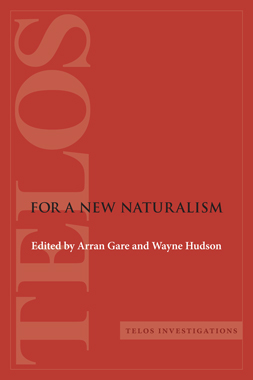 Western civilization has been afflicted by a divide between the sciences and the humanities, a divide that has been harmful to both. The first volume in our new Telos Investigations series, For A New Naturalism elaborates the implications of recent developments in natural philosophy that challenge both Cartesian dualism and reductionism. The contributors to this volume write from a variety of political, philosophical, and scientific standpoints. They all agree, however, that a civilization based on reductionist naturalism, with its impoverished understanding of both human life and the universe, is failing to generate the political and social thought we need. And they all support the need for a wider naturalism than the objectivating naturalism that emerged in seventeenth-century Europe. In addressing the contested status of naturalism in contemporary philosophy, the contributions to this volume question both prevailing assumptions about nature and assumptions about what is knowledge. They argue for a new alliance between science and the humanities, and spell out some of the implications of this challenge for philosophy, society, and religion. Western civilization has been afflicted by a divide between the sciences and the humanities, a divide that has been harmful to both. The first volume in our new Telos Investigations series, For A New Naturalism elaborates the implications of recent developments in natural philosophy that challenge both Cartesian dualism and reductionism. The contributors to this volume write from a variety of political, philosophical, and scientific standpoints. They all agree, however, that a civilization based on reductionist naturalism, with its impoverished understanding of both human life and the universe, is failing to generate the political and social thought we need. And they all support the need for a wider naturalism than the objectivating naturalism that emerged in seventeenth-century Europe. In addressing the contested status of naturalism in contemporary philosophy, the contributions to this volume question both prevailing assumptions about nature and assumptions about what is knowledge. They argue for a new alliance between science and the humanities, and spell out some of the implications of this challenge for philosophy, society, and religion.
Continue reading →
By Russell A. Berman · Monday, June 12, 2017 Telos 179 (Summer 2017) is now available for purchase in our store.
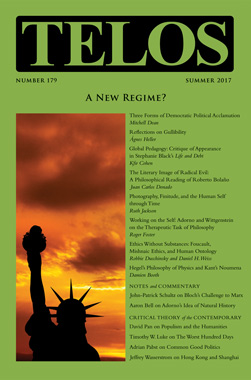 When the historian Ken Burns spoke at the Stanford University commencement last June, he delivered an exceptionally political address, including an attack on what he labeled the “Vichy Republicans.” Those Republican leaders who had not distanced themselves from candidate Trump, so Burns, were the equivalent of the Vichy French who collaborated with Hitler. That master metaphor, comparing 2016 to 1933, has continued into the new administration, with the anti-Trump camp labeling itself as “the resistance.” Despite Burns’s historiographical authority, one might question the validity of the underlying equation. No doubt the policies of the Trump administration are more conservative than those of Obama—hardly surprising—but the paradigms of the totalitarianism of the twentieth century are not necessarily the most adequate theoretical tools to analyze early twenty-first-century political phenomena. As emotionally satisfying as it may be for some to try to relive battles of earlier decades, Critical Theory ought to try to do better. We may very well be entering a different political era, a new regime, and not only in the United States. Can we describe it more effectively? When the historian Ken Burns spoke at the Stanford University commencement last June, he delivered an exceptionally political address, including an attack on what he labeled the “Vichy Republicans.” Those Republican leaders who had not distanced themselves from candidate Trump, so Burns, were the equivalent of the Vichy French who collaborated with Hitler. That master metaphor, comparing 2016 to 1933, has continued into the new administration, with the anti-Trump camp labeling itself as “the resistance.” Despite Burns’s historiographical authority, one might question the validity of the underlying equation. No doubt the policies of the Trump administration are more conservative than those of Obama—hardly surprising—but the paradigms of the totalitarianism of the twentieth century are not necessarily the most adequate theoretical tools to analyze early twenty-first-century political phenomena. As emotionally satisfying as it may be for some to try to relive battles of earlier decades, Critical Theory ought to try to do better. We may very well be entering a different political era, a new regime, and not only in the United States. Can we describe it more effectively?
Continue reading →
By Jon Wittrock and Richard Polt · Monday, December 12, 2016 Telos 177 (Winter 2016) is now available for purchase in our store.
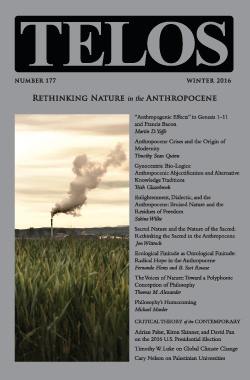 While the term Anthropocene was used in the USSR already in the 1960s to refer to the late Quaternary era, it rose to prominence more recently when introduced by Eugene F. Stoermer and Paul J. Crutzen. As the very word indicates, this is an epoch when humanity has taken center stage in the sense that its activities now have a major, global, and lethal impact. The shadow of human-caused global destruction and mass death haunts this epoch, and indeed, humanity’s newly acquired capacity for devastation is one of the Anthropocene’s most marked traits. While mass extinctions are hardly new phenomena and while the specter of the extinction of humanity due to some sudden catastrophe was there even before human beings were aware of it in scientific terms, the actual capacity of humanity to extinguish itself along with a large swath of other species on the planet is new, and the stakes of human action are higher. While the term Anthropocene was used in the USSR already in the 1960s to refer to the late Quaternary era, it rose to prominence more recently when introduced by Eugene F. Stoermer and Paul J. Crutzen. As the very word indicates, this is an epoch when humanity has taken center stage in the sense that its activities now have a major, global, and lethal impact. The shadow of human-caused global destruction and mass death haunts this epoch, and indeed, humanity’s newly acquired capacity for devastation is one of the Anthropocene’s most marked traits. While mass extinctions are hardly new phenomena and while the specter of the extinction of humanity due to some sudden catastrophe was there even before human beings were aware of it in scientific terms, the actual capacity of humanity to extinguish itself along with a large swath of other species on the planet is new, and the stakes of human action are higher.
Continue reading →
|
|
 The scientific method seems familiar to most, but an important element of this practice is often overlooked: the metaphor. This article explores the role played by metaphors in the conception and experimentation of scientific hypotheses, and the extent to which the process of metaphorical consideration is founded in imagination and creativity. With positivistic and reductionist traditions coming to prominence within scientific disciplines, there is emerging a corresponding lack of imagination and increased dislocation from the natural processes being studied. Using the complex process logic involved in metaphorical understanding, the task will be to develop a new paradigm to break out of these stifling traditions, one that has the potential to consider the complex holistic interrelations of the biosphere. As the epoch of the Anthropocene becomes more inculcated in contemporary culture, there has never been a more important time to reassess our relationship to, and position within, the natural world.
The scientific method seems familiar to most, but an important element of this practice is often overlooked: the metaphor. This article explores the role played by metaphors in the conception and experimentation of scientific hypotheses, and the extent to which the process of metaphorical consideration is founded in imagination and creativity. With positivistic and reductionist traditions coming to prominence within scientific disciplines, there is emerging a corresponding lack of imagination and increased dislocation from the natural processes being studied. Using the complex process logic involved in metaphorical understanding, the task will be to develop a new paradigm to break out of these stifling traditions, one that has the potential to consider the complex holistic interrelations of the biosphere. As the epoch of the Anthropocene becomes more inculcated in contemporary culture, there has never been a more important time to reassess our relationship to, and position within, the natural world. 










